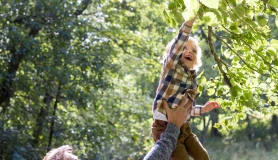If it were possible to pause real life, I may have needed to take a few days to wrap my head around the sudden, dramatic change in my toddler as she approached her third birthday. Usually very sweet, sensitive and deeply empathic, my previously happy little one was seemingly in the grips of something bigger than herself. Intent on doing the exact opposite of everything requested, physically lashing out at us and becoming so frustrated that she would burst into tears and fall, helpless, into our open arms. We quickly identified the change as a growth spurt of some kind and set about putting in place long discussed emergency parenting strategies in order to help guide her through this phase. To no avail. No amount of patience, talking to her about her big feelings (that might have helped, had she actually been listening) or trying to diffuse the situation seemed to help. We were as gentle and understanding as could be.
As the weeks turned into months and our daughter appeared to become angrier than ever, we did a lot of thinking, a lot more reading, a great deal of late night talking and generally fussing over the whole thing, as you do. We even did the whole “how could we have got it so wrong?” and momentarily threw the proverbial baby out along with her bathwater.
Somewhere, in the midst of all of this, it finally occurred to us that, perhaps, it wasn’t something to be “fixed” and that guidance didn’t necessarily breed immediate results. This might just have to be one of those things that you just ride out. And we did, 6 or so months later the whole thing passed and with it came a new level of understanding and a kind of maturity (don’t get me wrong, she’s still only 3…).
Speaking with other mums and conducting a little Google research turned out some surprising results. Turning three is quite a common time for children to go through a phase of intense turmoil. For some, it starts a little before their third birthday and others can be almost four. Of course, some may breeze through this and the “terrible-twos” but one thing I learned is that parenting has little to do with it.
So, what is it about being three that is such a struggle for children?
Around the age of 3-4, children begin to develop a stronger sense of themselves, who they are and what they do and don’t like. Naturally, while they are still too young to be able to regulate their emotional responses, this is going to lead to more frequent demands and more frustration as they experiment.
They also have an underdeveloped ability to control their impulses, which means they often feel irresistibly compelled to do certain things. This leads to a lot of ignoring requests, despite seeming to understand the reasonings. Again, this is all part of their innate desire to experiment.
So, how can we help them to adjust to this cognitive leap?
The most important part of helping your children through emotional and psychological developments and challenges is to be aware of what is normal. Once you know that they are behaving in an age appropriate manner, putting your own fears to one side and setting about being supportive becomes much easier.
Experimentation is not only normal, it is vitally important. Psychologically speaking, we learn about ourselves by defining not just who we are but also by who we are not. When disagreements arise, much of this is your child asserting themselves and what they do or do not like – try to find ways to keep their sense of self intact by giving them as much power and control over their lives as is feasible. For example, allowing them to go out of the house without any shoes on. Bring their shoes in your bag and see how far down the road they get before they start asking for their shoes. Be sure to stay close and alert them to dangers like glass or animal feces, but you will more than likely find that your child is asking for their shoes long before you encounter any potential issues. And, that is the end of the experiment. They learned, for themselves, why we wear shoes outside and are unlikely to leave without their shoes again.
Of course, we can’t always offer them full control – sometimes things just need to be, like when we need to leave the house on time. In these circumstances, simply taking the time to explain to your child why things are happening can be enough to help them to feel less frustrated. They will likely still be upset, perhaps even lash out but this is all part of their underdeveloped ability to regulate their emotional responses. A little hug, some understanding and a lot of patience will see them through their darkest moments.
Turning three can be a frustrating time for all concerned, but, as it happens, turning into a tiny threenager is a completely normal developmental phase that should pass with time and compassionate parenting.
However, if you suspect there is more to a recent change in behaviour than a growth spurt or developmental leap then seek professional advice from your child’s health practitioner.







